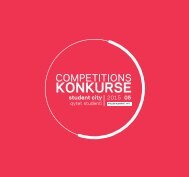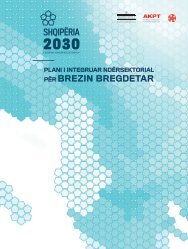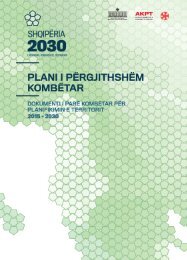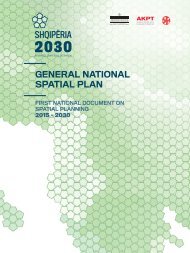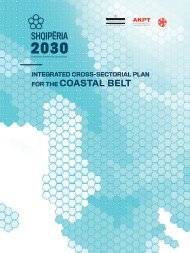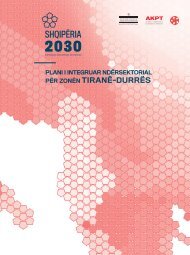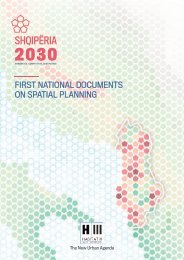Integrated Cross-Sectorial Plan of Tirana-Durres Area
The Albanian Government and the National Spatial Plan have identified the Tiranë-Durrës area, as one of the most important economic areas of the country, and of the Balkan region. To ensure a sustainable territorial and urban development of this area, the Ministry of Urban Development in cooperation with the National Territorial Planning Agency has taken the initiative to draft a Cross-sectoral Integrated Plan for the economic area Tiranë – Durrës. The metropolitan region under study includes territories administered by 5 municipalities: Tiranë, Durrës, Vorë, Shijak, Kamëz.
The Albanian Government and the National Spatial Plan have identified the Tiranë-Durrës area, as one of the most important economic areas of the country, and of the Balkan region. To ensure a sustainable territorial and urban development of this area, the Ministry of Urban Development in cooperation with the National Territorial Planning Agency has taken the initiative to draft a Cross-sectoral Integrated Plan for the economic area Tiranë – Durrës. The metropolitan region under study includes territories administered by 5 municipalities: Tiranë, Durrës, Vorë, Shijak, Kamëz.
You also want an ePaper? Increase the reach of your titles
YUMPU automatically turns print PDFs into web optimized ePapers that Google loves.
RP4- Economic development <strong>of</strong> private<br />
farms and cooperatives<br />
Restructuring and modernization <strong>of</strong> farms<br />
will be carried out first and foremost through<br />
community awareness on “bio” products and<br />
avoiding the treatment <strong>of</strong> products with nonorganic<br />
methods. The somewhat primitive<br />
methods <strong>of</strong> working processes in agriculture,<br />
in the selection <strong>of</strong> seeds, cultivars and the<br />
appropriate breeds should be replaced with<br />
modern methods <strong>of</strong> work that will lead to more<br />
accurate orientation and growth in markets<br />
based on the diversification <strong>of</strong> agricultural<br />
products.<br />
An essential step in this development is<br />
cooperation between private and public<br />
structures: making local government<br />
territorial spaces available for frequent<br />
meetings among local farmers, trainers,<br />
researchers, entrepreneurs, etc., with a<br />
view to building a communication network,<br />
thus creating the possibility <strong>of</strong> establishing a<br />
climate <strong>of</strong> trust on partnerships.<br />
RP4.1- Restructuring <strong>of</strong> agricultural farms<br />
The restructuring <strong>of</strong> agricultural farms will<br />
change the nature <strong>of</strong> the production operation<br />
system at local level. The line ministry,<br />
the Regional Development Agency and the<br />
municipalities <strong>of</strong> the region should develop<br />
structural policies based on land reform<br />
(consolidation <strong>of</strong> agricultural land) and its<br />
privatization.<br />
Consolidation <strong>of</strong> agricultural land is the<br />
process <strong>of</strong> uniting land plots to form larger<br />
farms. The purpose <strong>of</strong> farm consolidation is to<br />
better organize work and increase productivity<br />
in the markets. The aim is to develop and<br />
solidify the operational units that used to be<br />
scattered, in order to work together with the<br />
intention <strong>of</strong> forming larger areas with the<br />
same character <strong>of</strong> agricultural development.<br />
For farm consolidation it is suggested to:<br />
• Encourage the interaction <strong>of</strong> family farms,<br />
such as “bio” farms, to increase the likelihood<br />
<strong>of</strong> certified “bio” products on a regional scale.<br />
Establishing pilot projects based on the land<br />
fund and consolidation schemes will stimulate<br />
a broad participation <strong>of</strong> farmers in these<br />
schemes. Legal and fiscal incentives should<br />
be directed towards projects that support<br />
the cooperation <strong>of</strong> small and medium-sized<br />
stakeholders.<br />
• Strengthen the interaction dynamics<br />
<strong>of</strong> small farms through qualification and<br />
training <strong>of</strong> young farmers to cooperate under<br />
a product pr<strong>of</strong>iling. Unification according to<br />
quality, product diversity and agricultural<br />
standardization will increase the possibilities<br />
for survival in the free competition.<br />
• Restructuring should be simultaneously<br />
targeted at the creation <strong>of</strong> collection and<br />
storage farms, focused on the processing and<br />
marketing <strong>of</strong> the product as a final “Brand”,<br />
in order to specialize the work processes and<br />
to ensure the desired quality. The introduction<br />
and development <strong>of</strong> the region’s traditional<br />
product brand would create the conditions<br />
for an added value in product marketing on<br />
international networks and would create a<br />
stimulating spirit for “Slow-food” tourism.<br />
RP4.2- Opportunities for cooperation – the<br />
establishment <strong>of</strong> private cooperatives<br />
The construction <strong>of</strong> private cooperatives will<br />
boost agricultural production at macro level,<br />
and will create new financing opportunities<br />
for small and medium-sized farms to become<br />
part <strong>of</strong> these schemes, creating a sustainable<br />
economic system for major agricultural<br />
activities.<br />
The consolidation <strong>of</strong> agricultural farms and<br />
cooperatives will serve as a basic instrument<br />
to return marginalized lands into productive<br />
lands, increase income in rural areas and open<br />
new education branches for young people in<br />
rural areas.<br />
Encouraging cooperation among farmers will<br />
affect the development <strong>of</strong> the rural community,<br />
allowing the transfer <strong>of</strong> knowledge and<br />
technology in rural areas.<br />
138






